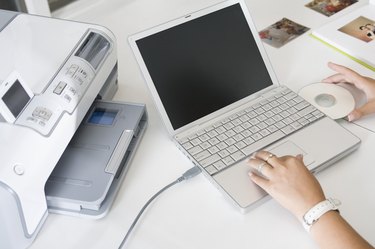
Computer monitors output light at around 350 to 450 candelas (cd) per square meter (m). Measuring a screen's brightness, or luminance, helps determine what monitors need replacement or repair. It can also help distinguish different models' luminance from an angle. At $500 to $800 for a new unit, an individual user may not find it practical to purchase the light meter needed for such a measurement; however, a company's IT department, a small computer shop, and a product reviewer or procurer may find it worthwhile.
Step 1
Purchase a photometer that registers luminance in candelas per square meter (cd/m^2). See the Resource section below for sources.
Video of the Day
Step 2
Turn off the room's lights, leaving the monitor on.
Step 3
Turn the monitor's brightness up to maximum.
Step 4
Turn the screen white somehow, to get a standardized reading. One way is to open up word processing software and enlarge a blank document to fill most of the screen.
Step 5
Place the flat of the photometer's sensor up against the screen; then take a reading per the instructions provided with the photometer. Placing it up against the screen makes sure you get the maximum intensity and that you standardize the measurement procedure between screens. Measuring from where the computer user would be sitting introduces too many variables. Make sure the sensor is placed on the white area of the screen, again for the purpose of standardization.
Step 6
Take a few readings at different angles, if you are interested in how narrow the viewable range is. Again, make sure to standard the measurement. For example, take all the off-center readings at an angle of 30 degrees from the screen. A protractor may be needed to ensure precision.
Video of the Day